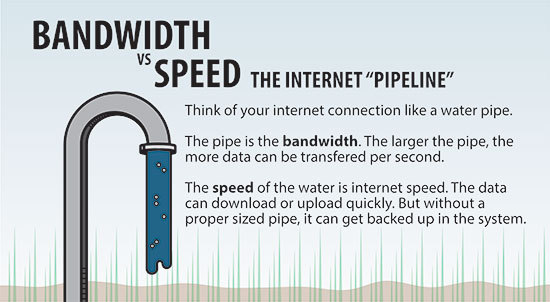
What Is Business Bandwidth?
In the jargon of electronic communications, bandwidth and business internet speed sometimes seem to mean the same thing. At other times, the two terms clearly refer to something different.
Understanding the difference in meanings might not seem like a big deal to people who don’t work in IT departments. However, with business operations increasingly dependent on computerized networks running effectively, people throughout organizations - decision-makers and other managers, in particular – might benefit from having a working understanding of the terms.
Are Bandwidth and Speed the Same?
Definitions evolve as technology advances, but bandwidth and speed have different meanings, SDN Communications Sales Engineer Chris Aeilts said.
“When we use the terms in the industry, we almost use them interchangeably,” he said. “The context in which they are used is more important than the actual words.”
Bandwidth refers to the amount of radio frequency spectrum or the size of an internet pipe available to transmit electronic information, he explained.
Speed refers to how fast the information can travel from a given point to its destination.
Comparisons to other pathways, such as a water hose (see the graphic below) or a multilane highway, can help illustrate the difference. Let’s go with a three-lane highway with exits to single-lane roadways.
Find out how your internet is performing by taking our business internet speed test. Just use the button below and then click "GO."
Find out how your internet is performing by taking our speed test. Just use the button below and then click "GO."

Does Higher Bandwidth Mean Higher Speed?
Unblocked by traffic jams or poor road conditions, all of the vehicles on the highway will travel at the same speed – just below the speed of light. However, traffic jams or poor conditions at some junctures, such as an exit onto a one-lane pathway, might force vehicles on the freeway to stop briefly, queue up and wait for their turn to proceed.
Electronic traffic doesn’t reduce its rate of speed; it’s either moving or stopped, though possibly for only a millisecond. Ultimately, the speed of a transmission will depend on how quickly it can get through the weakest connecting points. (In computer talk, delays are referred to as latency.)
The width of a roadway sets a maximum in the amount of information that can be moved at a given moment, but the size does not set speed.
“The wider the highway, the more information you can move through at a given speed,” Aeilts said.
To get maximum throughput, businesses have to make sure every link in an electronic pathway meets their preferred standard, he said.
A capacity of 25 megabits per second has become a common starting point for small organizations, but most business networks are capable of being scaled up to a gigabit or more of capacity. One gigabit equals 1,000 megabits.
Bits – sometimes confused with bytes – are the most basic unit of measurement in telecommunications. One byte, in comparison, equals eight bits. Bits generally are used to describe transfer rates, experts say, and bytes are more commonly used to describe storage capacity.
A gigabit equals 1 billion bits, and gigabyte equals 1 billion bytes. Prefixes such as kilo and tera can add to the complexity of terminology. A kilobit equals about 1,000 bits, and terabyte equals approximately 1 trillion bytes.
Measurement terms help demonstrate how small differences in words can lead to big differences in understanding. Which gets back to Aeilts’ point about the importance of speaking in context.
“Just because you think a word means one thing doesn’t mean everybody else does,” he said. “It’s important to communicate information in the correct context so that people know beyond a shadow of a doubt what you’re talking about.”
Business Internet Plans and Internet Providers
SDN Communications is a regional fiber internet provider for businesses specializing in broadband connectivity and managed services in South Dakota. We service businesses in Sioux Falls, Rapid City, and other cities in South Dakota. When choosing a business internet plan, it's essential to understand your needs for fast internet speeds and a reliable business internet service provider.
Whether it's a wired connection, secure wireless, or remote connectivity for video conferencing that your business needs, SDN offers better upload speeds and performance that other internet service providers in the area are unable to match. How much internet speed your business requires is dependent on your operational needs, which we'll help walk you through and determine what works best for your business internet connection.




